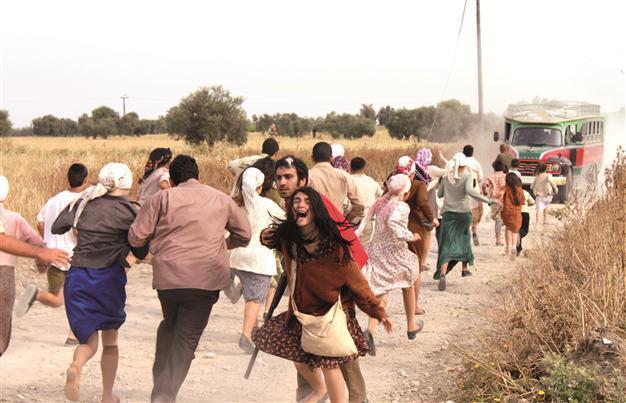Turkey and Greece unite on screen at ‘Documentarist’ fest
EMRAH GÜLER ANKARA - Hürriyet Daily News

Conflict between Turks and Greeks came to the screen last year in acclaimed Turkish Cypriot director Derviş Zaim’s feature “Gölgeler ve Suretler” (Shadows and Faces).
Celebrating its fifth year, Documentarist, Istanbul’s Documentary Days, is preparing to bring moviegoers face to face with the harsh realities of today (and yesterday) as seen through the eyes of nearly 100 filmmakers. This year’s festival, taking place between June 1-6, features a section devoted to Greece and the difficult times it has experienced in the last couple of years.The section “Our Nextdoor Neighbor Greece” is the latest example in a string of collaborations between Turkey and Greece, as well as a growing interest in each other’s work both in film and TV. The sometimes-troubled relationship between the neighbors seems to have taken a friendly turn in the past couple of years, at least as seen through the camera.
In this year’s Documentarist, one can see examples from Greek cinema that shed a harsh light on the tough times of the recent past. Myrna Tsapa’s “Katinoula” of 2012 is a candid look at an elderly woman of Greek origin living in Egypt. Directors Chyrysa Tzelepi and Tania Hatzigeorgiou’s film, “25th Meridien,” which took five years to complete, follows the lives of the few remaining Greek residents on the largest Turkish island in the Aegean, Gökçeada, or Imbros.
Some of the other films from Greece are Yannis Misouridis’s “Konstantinopoleos 280, Thessaloniki,” part of the TV documentary “Docville,” and “Krissis,” a look at the crippling Greek economic crisis by directors Nikos Katsaounis and Nina Maria Paschalidou, as documented on a journey with 14 photographers. Perhaps the most anticipated documentary from Greece will be last year’s “Children of The Riots,” in which Christos Georgiou directs his camera at unemployment, economic depression, and protests as evidenced by a friend of Alexandros Grigoropoulos, a fifteen-year-old who was killed by the police in the riots in 2008.
The close ties between Turkish and Greek filmmakers made headlines earlier this year at the Berlin International Film Festival, when Turkish director Emin Alper won the Caligari award with “Tepenin Ardı” (Beyond the Hill), a Turkish-Greek coproduction. The film is a brutal look at a Turkish man, his troubled relationship with his family, and their escalating dispute with trespassing nomads.
Another unresolved conflict between Turks and Greeks came to the screen last year in acclaimed Turkish Cypriot director Derviş Zaim’s feature “Gölgeler ve Suretler” (Shadows and Faces). Zaim has made previous forays into the Cyprus conflict in the last decade. He co-directed “Parallel Trips” in 2004 with Greek Cypriot director Panicos Chrysanthou, in which the directors, from opposite sides of the divided island, told of human dramas in the aftermath of the war of 1974 and their reflections today.
Zaim later produced Chrysanthou’s feature “Akamas,” about a love affair between a Turkish Cypriot and Greek Cypriot, in 2006. In “Gölgeler ve Suretler,” Zaim literally and artistically returned home, to the very beginning of the conflict between the island’s Turks and Greeks, in a small village where Turk and Greeks were living peacefully together back in 1963.
TV collaborations
Following the success of the Turkish series “Yabancı Damat” (The Foreign Groom), a love story between a Turkish woman and her Greek boyfriend Niko, on both sides of the Aegean, Turkey and Greece are uniting forces for the small screen. The coming year will see two collaborations for TV, both backed by the Culture Ministries of Turkey and Greece.
One of these projects, “Muhteşem Yolculuk” (The Amazing Journey), has already begun production, bringing together Maria Ekmekçioğlu, a Greek gourmet chef, and Turkish director Erdal Murat Aktaş as they journey from Istanbul, travel along the Aegean coasts of both countries, and end up in Athens. The show will compare apects of the two cultures, from history to food and music. Politics between Greece and Turkey may not always be sunny, but an impressive and increasing amount of shared screen time seems to have kick-started a stronger bond between the moviegoers and filmmakers in the neighboring countries.
















